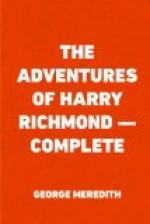The door closed on them and I thought it was a vision that had passed. But now my father set my heart panting with questions as to the terrible possibility of us two ever being separated. In some way he painted my grandfather so black that I declared earnestly I would rather die than go to Riversley; I would never utter the name of the place where there was evil speaking of the one I loved dearest. ‘Do not, my son,’ he said solemnly, ‘or it parts us two.’ I repeated after him, ’I am a Roy and not a Beltham.’ It was enough to hear that insult and shame had been cast on him at Riversley for me to hate the name of the place. We cried and then laughed together, and I must have delivered myself with amazing eloquence, for my father held me at arms’ length and said, ’Richie, the notion of training you for a General commandership of the British army is a good one, but if you have got the winning tongue, the woolsack will do as well for a whisper in the ear of the throne. That is our aim, my son. We say,—you will not acknowledge our birth, you shall acknowledge our worth.’ He complained bitterly of my aunt Dorothy bringing a lawyer to our house. The sins of Mrs. Waddy were forgiven her, owing to her noble resistance to the legal gentleman’s seductive speech. So I walked up and down stairs with the kings of England looking at me out of the coloured windows quietly for a week; and then two ugly men entered the house, causing me to suffer a fearful oppression, though my father was exceedingly kind to them and had beds provided for them, saying that they were very old retainers of his.
But the next day our scarlet livery appeared. After exacting particular attention to his commands, my father quitted Mrs. Waddy, and we mounted the carriage, laughing at her deplorable eyes and prim lips, which he imitated for my amusement. ‘A load is off my head,’ he remarked. He asked me if splendour did not fatigue me also. I caught the answer from his face and replied that it did, and that I should like to go right on to Dipwell ‘The Burgundy sleeps safe there,’ said my father, and thought over it. We had an extraordinary day. People stood fast to gaze at us; in the country some pulled off their hats and set up a cheer. The landlords of the inns where we baited remained bare-headed until we started afresh, and I, according to my father’s example, bowed and lifted my cap gravely to persons saluting us along the roads. Nor did I seek to know the reason for this excess of respectfulness; I was beginning to take to it naturally. At the end of a dusty high-road, where it descends the hill into a town, we drew up close by a high red wall, behind which I heard boys shouting at play. We went among them, accompanied by their master. My father tipped the head boy for the benefit of the school, and following lunch with the master and his daughter, to whom I gave a kiss at her request, a half-holiday was granted to the boys in my name. How they cheered! The young lady saw my delight,




